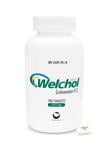
October 12, 2009 – Daiichi Sankyo Inc. (DSI) last week said the U.S. Food and Drug Administration (FDA) approved the supplemental new drug application for Welchol (colesevelam HCl) for children and teens with heterozygous familial hypercholesterolemia (heFH).
The FDA clearance allows the drug to be used as an adjunct to diet and exercise for the reduction of elevated low-density lipoprotein cholesterol (LDL-C) in boys and postmenarchal girls, 10 to 17 years of age, with heFH alone or in combination with a statin after failing an adequate trial of diet therapy. Originally approved in 2000 for LDL-C lowering and in 2008 for A1C reduction in adults, Welchol is approved as an adjunct to diet and exercise to reduce elevated LDL-C in adults with primary hyperlipidemia and improve glycemic control in adults with type 2 diabetes mellitus.
Familial hypercholesterolemia is a genetic disorder resulting in elevated LDL cholesterol and increased risk of cardiovascular disease (CVD).(1) There are 10 million people with FH worldwide, the majority of whom have heFH.(2)
"The FDA approval of Welchol for children with inherited high cholesterol provides another important treatment option for these children, whose elevated LDL cholesterol puts them at increased risk for cardiovascular disease*," said Evan A. Stein, M.D., PhD, director of the Metabolic and Atherosclerosis Research Center, Cincinnati, Ohio. "The pivotal trial of Welchol in this pediatric patient population demonstrated that Welchol, as monotherapy or when combined with a statin, significantly reduced LDL-C."
The approval of Welchol for pediatric patients with heFH is based on data from an eight-week, multicenter, randomized, placebo-controlled clinical study, which evaluated the efficacy of Welchol tablets (1.875 or 3.75 g/d) as monotherapy or in combination with a statin. The study was conducted with boys and postmenarchal girls 10-17 years of age, who were either treatment naive or on stable background statin therapy. The most commonly reported adverse reactions reported in more than or equal to 2 percent of patients, and more commonly than those given placebo, were nasopharyngitis, headache, fatigue, creatine phosphokinase increase, rhinitis and vomiting. (3)
The FDA also approved Welchol (colesevelam HCl) for oral suspension, providing an alternative to the current tablet formulation. Welchol for Oral Suspension is indicated as an adjunct to diet and exercise to improve both glycemic control in adults with type 2 diabetes mellitus, and to reduce elevated LDL cholesterol in adults with primary hyperlipidemia (Fredrickson Type IIa) as monotherapy or in combination with a hydroxymethyl-glutaryl-coenzyme A (HMG CoA) reductase inhibitor (a statin). Welchol for Oral Suspension is also indicated for use as an adjunct to diet and exercise for the reduction of elevated LDL-C in boys and post-menarchal girls, 10 to 17 years of age, with heFH alone or in combination with a statin after failing an adequate trial of diet therapy. The recommended dose of Welchol for Oral Suspension is one 3.75 gram packet once daily.
Welchol is contraindicated in individuals with bowel obstruction, those with serum triglyceride concentrations of more than 500 mg/dL, or with a history of hypertriglyceridemia-induced pancreatitis.
For more information: www.Welchol.com
References:
1. Centers For Disease Control and Prevention, Diagnosis and Treatment, Program for Familial Hypercholesterolemia. www.cdc.gov/prc/research-projects/special-interest-projects/diagnosis-treatment-familial-hypercholesterolemia.htm. Site accessed June 23, 2009.
2. Civeira F. et al. “Guidelines for the diagnosis and management of heterozygous familial hypercholesterolemia.” Atherosclerosis, 2004; 173: 55-68.
3. Stein E. A. et al. “Colesevelam HCl: efficacy and safety in pediatric subjects with heterozygous familial hypercholesterolemia.” Poster presented at the American Heart Association's (AHA) Annual Scientific Sessions 2008; Nov. 8-12, 2008, New Orleans, La.


 January 28, 2026
January 28, 2026 









